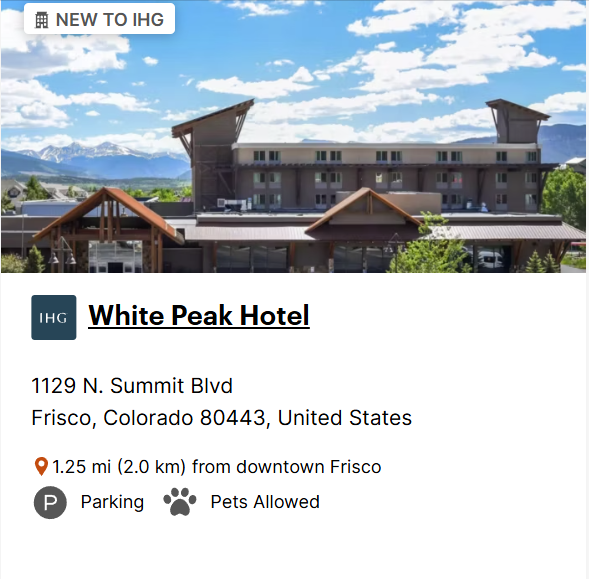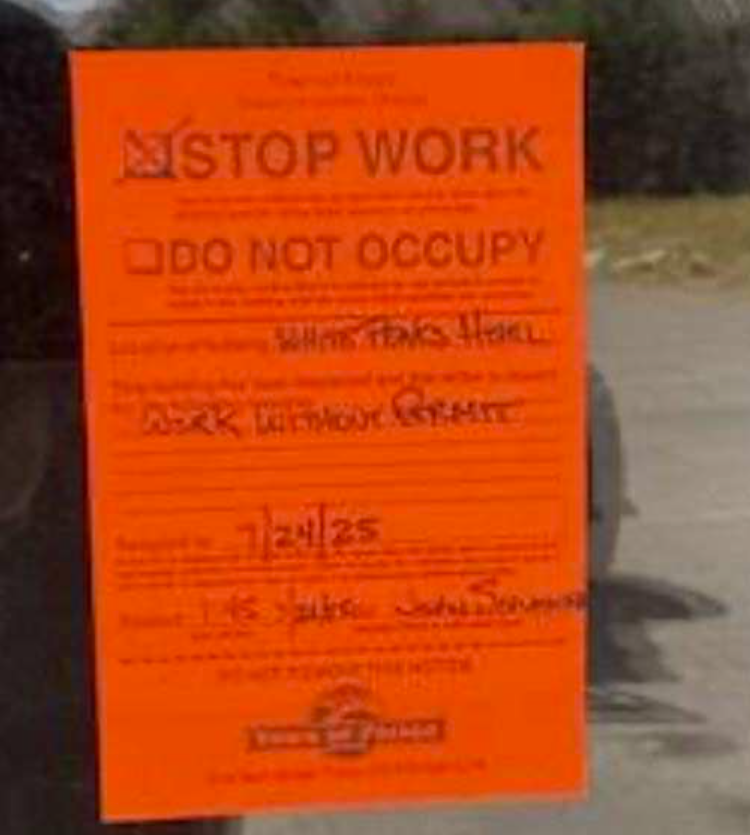The White Peak Hotel in Frisco, Colorado used to be a Holiday Inn. It appears it may have been deflagged half a dozen years ago, or transitioned to a Choice property and became unbranded. Now it appears to be returning to IHG.

To get it up to snuff there’s some work going on there, and they aren’t open or taking reservations. However there was a stop work order posted at the entrance, according to this photo sent to me by a reader. And I’ve been going down a rabbit hole over a property I’m not likely ever to visit.

The owner reportedly pled guilty to third-degree criminal trespass and disorderly conduct, tied to entering a woman’s guest room in the middle of the night, though the case may not have been airtight due to lack of witnesses and some contradictory statements by the victim. The key allegation made was that he used a master key to enter a guest’s room in the middle of the night.
On Friday, Feb. 28, Pietraszek was hosting a town of Frisco event at the Sporting News Grill, located on the second floor of the Holiday Inn. At about 7:30 p.m., the victim and two of her friends entered the bar to have dinner, Patty said.
Pietraszek bought the victim and her friends several rounds of drinks and eventually joined their table as nighttime gave way to early morning. According to witness statements, Pietraszek became thoroughly intoxicated as the night progressed, Patty said.
At one point, shortly before 3 a.m., Pietraszek put his hand on the victim’s thigh and lower back, Patty said. The victim, who told Pietraszek she was married, then left the bar and returned to her room.
About 30 minutes later, Pietraszek used his master key to enter the victim’s room, bearing snacks and saying he had come to check on her, according to Frisco police records. Pietraszek quickly left after being asked to do so by the victim and her female friend.
Pietraszek’s attorney, Fred Winocur, of Denver, argued the whole case was based on a misunderstanding, saying Pietraszek did not use a master key to enter the victim’s room. Rather, Winocur said the victim and her friend gave Pietraszek their key while at the bar with the understanding that he would check up on them later.
“As a manager, Mr. Pietraszek has a responsibility to be a host and to perform certain hospitality duties,” Winocur said. “He had a responsibility to ensure the welfare of his guests, especially those who had been consuming alcohol.”
A woman also posted to reddit claiming that she worked at the hotel, that he was verbally abusive to immigrant staff, and that he became inappropriately physical. She says that he offered her a room to use at the hotel, and she woke up one night around 2 a.m. to find her door open and a tall man standing inside the room. The man fled when she yelled. And she says she believes it was the hotel’s owner.
According to the EPA, he agreed to a $105,000 civil penalty in a Clean Water Act action and he reportedly participated in a RICO lawsuit against a marijuana business near his hotel calling such a business “unseemly” and that having it nearby would sully the Holiday Inn brand (my personal take: in ways that his ownership does not..?).
What became especially interesting to me was reading up on the language in hotel franchise documents, and the broad approval and termination rights chains give themselves tied to an owner’s criminal history and conduct that could damage the brand. A misdemeanor “master‑key” incident generally isn’t an automatic disqualifier everywhere—but many brands could use it if they wanted to to deny an affiliation. Recently hotel chains haven’t seemed to want to deny very many affiliations.
- Brands screen owners/principals and can refuse or unwind deals. Marriott, for example, requires a “Post‑Approval Owner Background Check” fee charged when ownership changes, and Marriott runs an Operator Screen that includes third‑party background checks.
- Change of control/transfer needs consent. Generally any transfer requires the transferee and new interestholders to be a “Qualified Person.” Consent can be withheld by a chain even if other conditions are met.
Marriott defines a Qualified Person to include someone who “has not been convicted of a Serious Crime,” and “has not engaged in conduct that may adversely affect the Hotel, the System, or [the franchisor],” and is not a sanctioned or restricted person, and hasn’t been in material civil litigation with the franchisor.
“Serious Crime” though means punishable by more 1 year imprisonment or more than $10,000 fine. The franchise agreement also treats it as a default if an owner is convicted of a Serious Crime or engages in adverse conduct. Even without a felony, the “adverse conduct” catch‑all gives the brand discretion to deny an owner..
State franchise statutes, though, affect the ability to terminate use of a brand flag. Most states require “good cause.” Many statutes list felony conviction (or similar criminal misconduct) as immediate good cause without cure.
Entering a guest room with a master key, though, if it gets charged as a misdemeanor probably doesn’t qualify. A brand could go to the mattress with its reputation clause. Here that clearly didn’t happen. Personally, though, this seems like a hotel I wouldn’t want to visit. And I think less of IHG that they’re (re-)flagging it.


Sounds like claiming to be Basil Fawlty isn’t going to help in this case!
I don’t see the problem here. I’m sure the owner simply identified as a hotel maid.
Reddit? Rabbit hole? Gary… This is indeed a weird one, no doubt, but it seems a bit mirky.
Gary, I enjoyed the article, and compliment you on the references (I enjoyed the RICO link), but I am sure there is a misspelling or grammatical error I missed, so heck with you.
@This comes to mind — Haha. I could NOT-SEE any either. Now, where’s the fella from yesterday who was actually whining about a misplaced comma or whatever? Psh…
I’m not so sure that taking on a franchisee who’s a predator is really an astute business decision but that’s just me.
@1990 – the rabbit hole was reading franchise docs for Marriott (and Wyndham)
@This comes to mind
Cut the BS
@Gary Leff — I can only imagine… thank you for doing the digging so that the rest of us didn’t have to!